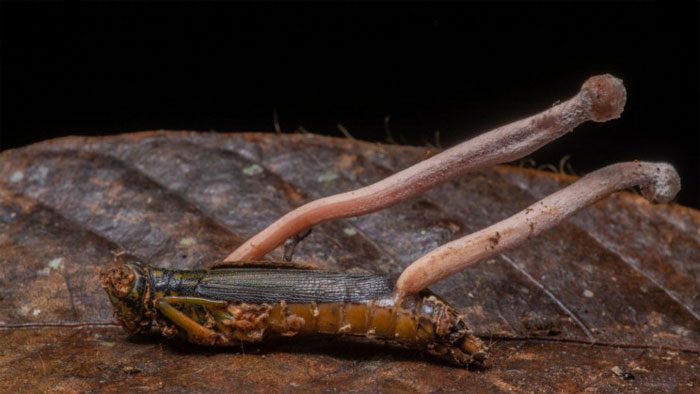The “magic” compound found in a type of mushroom in the Himalayas could be the breakthrough cancer patients have been waiting for.
According to Sciencealert, a new chemotherapy method derived from a “magic” chemical has been discovered to be an extremely effective cancer treatment. This drug, named NUC-7738, was developed by researchers at the University of Oxford in collaboration with the UK pharmaceutical company NuCana.
NUC-7738 has the ability to kill cancer cells more than 40 times more effectively than previous compounds, and when compared to existing chemotherapy drugs, it performs the process of killing cancer cells with less harm to the body.
NUC-7738 is still in the early stages of development, so we cannot yet access it as a medication. However, newly published clinical trials are showing promising results with this drug candidate, indicating it could provide a new treatment option for cancer patients.

Cordyceps mushroom growing from a wingless insect.
All of the powerful features of the drug are attributed to the active ingredient in NUC-7738, known as Cordycepin. Cordycepin, also known as 3′-deoxyadenosine (or 3′-dA), is a natural nucleoside analog first found in the parasitic fungus Ophiocordyceps sinensis, which grows in the high mountains of China and is commonly referred to as caterpillar fungus because it kills and mummifies the larvae of moths.
Cordycepin has been used as a herbal remedy in traditional Chinese medicine for generations. Today, scientists have recognized its tumor-killing potential after discovering the drug’s anti-cancer, antioxidant, and anti-inflammatory effects. These features have made Ophiocordyceps sinensis highly sought after, and it is often regarded as the most valuable parasitic species in the world.
However, alongside these miraculous properties, Cordycepin isolated from Ophiocordyceps sinensis also has its limitations. For instance, it is quickly destroyed in the bloodstream by the enzyme adenosine deaminase (ADA), surviving only 1.6 minutes in plasma. Furthermore, cells find it difficult to absorb the drug, and all of this means that the actual effectiveness of the Cordycepin molecule against cancer cells in the body is significantly weakened.
According to a study published in the journal Clinical Cancer Research, to make the drug viable, NUC-7738 was designed to allow Cordycepin to independently penetrate cells thanks to nucleoside transporters, enhancing the drug’s anti-cancer capabilities. Moreover, unlike the natural molecule, NUC-7738 is pre-activated and can resist degradation in the blood due to its integration of protective capabilities against the ADA enzyme.
These modifications make the anti-cancer properties of the drug candidate NUC-7738 more than 40 times stronger, as demonstrated in tests on various human cancer cell lines.
Furthermore, initial results from the first human clinical trial of NUC-7738 have also been promising. The Phase 1 trial, which began in 2019 and is still ongoing, has so far enrolled 28 patients with progressive tumors resistant to conventional treatments.
In the article published in the journal Clinical Cancer Research, researchers affirm that the weekly dose escalation of NUC-7738 for this group has been well tolerated by the patients. “These findings provide evidence for the concept that NUC-7738 overcomes the anti-cancer resistance mechanism that limits the activity of 3′-dA and supports further clinical evaluation of NUC-7738 as a new cancer treatment.”
Although this is certainly a promising start, it will still be some time before NUC-7738 is ready to serve patients outside of the trial.
Researchers are currently planning to conduct Phase 2 of the trial, once the safety of the drug has been more thoroughly demonstrated and the recommended regimen for Phase 2 patients has been determined.


















































